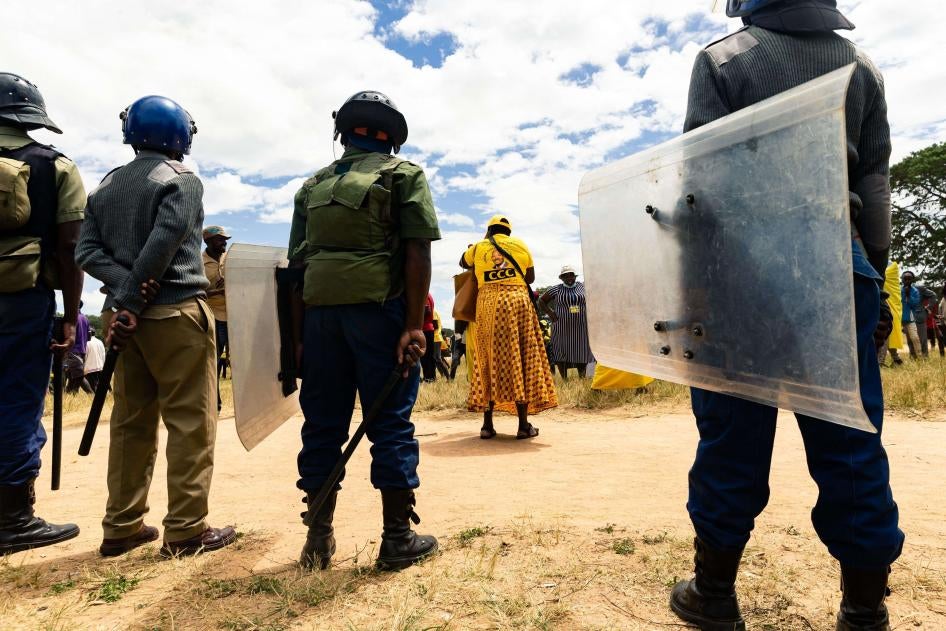(Johannesburg) – Zimbabwe authorities have failed to take necessary steps to ensure that the general election slated for August 23, 2023, meets international standards for free and fair elections, Human Rights Watch said in a report released today.
The 44-page report, “‘Crush Them Like Lice’: Repression of Civil and Political Rights Ahead of Zimbabwe’s August 2023 Election,” finds that the seriously flawed electoral process threatens the fundamental rights of Zimbabweans to freely choose their representatives. The electoral process has been undermined by the authorities’ adoption and use of repressive laws, the Zimbabwe Electoral Commission’s (ZEC) lack of impartiality, the Zimbabwe Republic Police’s partisan conduct and use of intimidation and violence against the opposition, the opposition’s lack of access to voter rolls, and impunity for individuals responsible for election-related abuses.
“Zimbabwe’s authorities have yet again demonstrated a lack of respect for the basic freedoms necessary for a credible, free, and fair election,” said Idriss Ali Nassah, senior Africa researcher at Human Rights Watch and lead author of the report. “The inability of many candidates to campaign freely and openly throughout Zimbabwe raises serious concerns about whether the election results will reflect the political will of Zimbabwe’s people.”
Human Rights Watch interviewed 28 people in April and May, including activists, journalists, opposition members, and victims of human rights abuses. Letters with questions sent to several government agencies and the ruling Zimbabwe African National Union–Patriotic Front (ZANU-PF) party received no response.
The pre-election environment in Zimbabwe poses many obstacles for the political opposition, Human Rights Watch said. The authorities have weaponized the criminal justice system against the ruling party’s opponents. Civil society activists and government critics expressed strong fears that the authorities intended to use the Private Voluntary Organizations Act and other laws to criminalize their activities ahead of the election.
The Criminal Law Codification and Reform Amendment Bill 2022, commonly known as the “Patriotic Bill,” which took effect in July, contains overly broad provisions that criminalize the rights to freedom of expression, peaceful assembly, and association.
Politicians from the main opposition party, the Citizens Coalition for Change, have been held in prolonged pre-trial detention or convicted on baseless, seemingly politically motivated charges. The party’s deputy spokesperson, Ostallos Siziba, said: “Right now, we cannot hold meetings in towns and cities, and we cannot go to the rural areas. ZANU-PF declared that rural areas are no-go zones for the opposition, and the ruling party causes violence any time the opposition tries to venture into the rural areas.”
The Zimbabwe police has selectively used the Maintenance of Peace and Order Act of 2019 to deny the opposition permission to hold meetings and campaign rallies, while allowing ZANU-PF to meet without hindrance.
ZANU-PF supporters have engaged in widespread harassment, threats, and acts of violence, preventing opposition parties from staging rallies, mobilizing, campaigning, and associating with supporters across the country.
There are also serious concerns about the independence, composition, and conduct of the ZEC. “The way the commission is constituted is a problem,” said a member of Heal Zimbabwe Trust, a national rights group. “Previously, the main political parties would second people to become commissioners, but the commissioners are now mostly chosen by the president after vetting by parliament. People lost confidence in the process because they think that the process is controlled by the state.”
Zimbabwe authorities should take all steps necessary to ensure that Zimbabwe police acts in a neutral and non-partisan fashion regarding the electoral campaign and all political parties’ activities, Human Rights Watch said. They should also ensure that police and other officials found responsible for human rights violations are held to account.
In April, President Emmerson Mnangagwa said that only election monitors from “friendly nations” will be invited to observe the elections. Since then, the European Union and a joint AU-Common Market for Eastern and Southern Africa mission have been granted permission to monitor the elections. Because observers might not be allowed access to all parts of the country, there are concerns that election-related abuses and illegal practices will go unaddressed.
The Southern African Development Community (SADC) and African Union (AU) member states should press the government of Zimbabwe to ensure that national and international electoral observers will have access to all election sites, Human Rights Watch said. The government should guarantee that observers will be free to move throughout the country and able to report on any election-related intimidation and violence.
They should also urge the government to implement the SADC Principles and Guidelines Governing Democratic Elections and the African Charter on Democracy, Elections and Governance, and ensure that SADC and AU election observers remain in Zimbabwe for a sufficient period beyond the vote count to monitor possible post-election related human rights violations.
“The Zimbabwe government needs to take concrete measures before the election to meet its obligations under national and international law to allow people to vote free of intimidation, fear, and violence,” Nassah said. “So far nothing indicates the authorities are willing to do that.”
|
News Release
Zimbabwe: Repression, Violence Loom over August Election
Abusive Laws, Partisan Government Agencies Undermine Free, Fair Vote
Your tax deductible gift can help stop human rights violations and save lives around the world.
Most Viewed
-
November 25, 2019
A Dirty Investment

-
December 21, 2023
Meta’s Broken Promises

-
June 3, 2025
“They’re Ruining People’s Lives”

-
December 11, 2018
No Support

-
December 4, 2020
“They’re Chasing Us Away from Sport”




